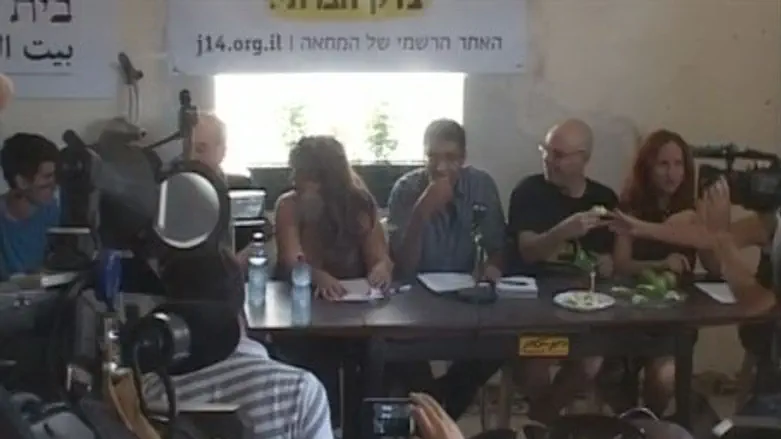
The Trajtenberg Committee for socio-economic changes in Israel presented its recommendations and final report on Monday, but that didn’t seem to appease those whose actions led to the establishment of the committee: The social protesters.
The committee was established in August after a wave of social protests swept Israel’s streets, most notably the tent protest which saw young Israelis living in tents on city streets in protest of the high cost of housing in Israel. Those same tent protesters held a news conference on Tuesday in which they publicly announced that they are rejecting the committee’s proposals.
“I think all the recommendations presented in the report do not challenge the system,” Professor Yossi Yonah of the Ben Gurion University, who was part of an alternate panel of experts, put together by the protesters, told Arutz Sheva.
“The whole issue in this social protest is challenging the system,” he added. “This is the very system that brought all the social ills we are suffering from, and to give us the same solutions that are a derivative of the system – that will not do. This is the reason for the deep disappointment that all of us here feel.”
The Trajtenberg Committee recommended a series of tax cuts and benefits for Israelis, such as the implementation of free education for children.
Overall, it recommends spending NIS 60 billion over the next five years on social needs, with most of the money to come from the defense budget.
The protesters’ rejection of the ideas is no surprise, since they rejected the committee from the get-go, refusing to meet with its members and even publicly calling for committee head Professor Manuel Trajtenberg to resign.
One of the co-organizers of the tent protest, Regev Contes, said that in light of the disappointing recommendations, the protesters will have to hit the streets once again. He promised that the street protests will resume right after the holiday of Sukkot.
“We’re going to start a huge public campaign,” Contes said. “We can have four million people march in the streets, but in the end the decision is in the hands of 120 members of the Knesset. We’re going to start a huge public campaign to push them and place tremendous pressure on those people.”
He reiterated the protesters’ demand that the Knesset formulate a new budget, and Prof. Yonah noted that a change in the budget is a derivative of a change from “the new liberal economic policies that are governing Israeli societies” which the protesters are demanding.
“We’re not necessarily advocating for socialism,” Prof. Yonah said. “We’re advocating for a welfare state which is an integral part of the free market.”
Contes, meanwhile, rejected the idea that the next stage of the protest should be a formation of a new social-based political party, saying “it’s too early” for that. He said that he has nothing against Prof. Trajtenberg himself.
“Prof. Trajtenberg himself is a lovely person,” Contes said. “I’m sure his heart is in the right place. Nevertheless, he had no mandate whatsoever to make these changes so there’s nothing good about it. These are only recommendations and you can be sure that the ministerial committee and the Knesset’s finance committee will speak about the recommendations for five years and tear them apart.”
The members of the Trajtenberg Committee responded to the protesters on Tuesday, saying it was their feeling that the protesters and their team of experts did not read the report carefully, and if they did, they deliberately chose to ignore the significant measures presented in it.
The committee members said that criticism is legitimate, but the criticism presented by the protesters and experts was unfair and not substantive.
“We would understand if they said that there is a gap in point or another or that a specific recommendation is not correct,” the committee stated on its website, “but claiming that the report is unacceptable and that there is nothing in it likely reveals something else.”
The committee members urged the public to read the recommendations for themselves so they can formulate their own opinions.